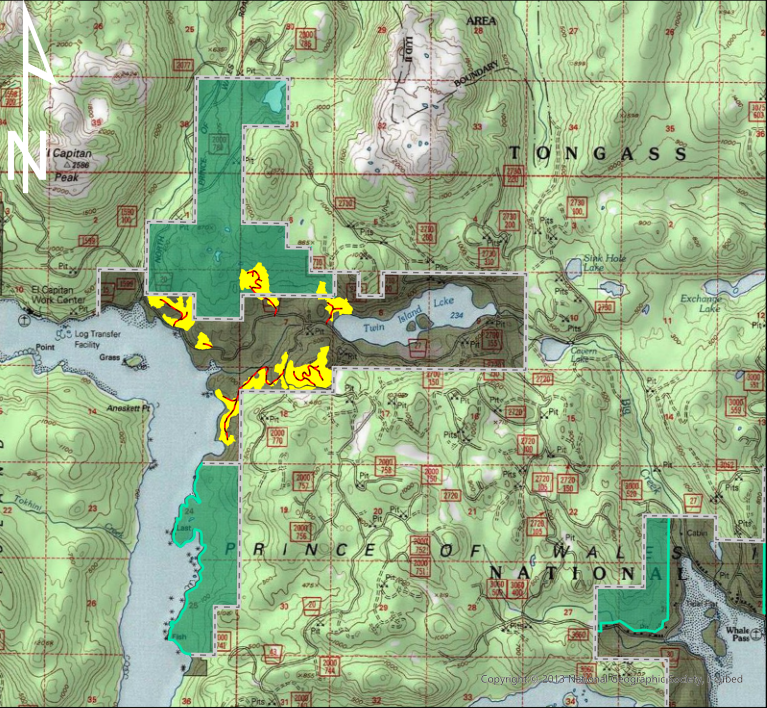
Demand for lumber is pushing the state’s Division of Forestry to pitch the sale of old growth forest near El Capitan Passage on northern Prince of Wales Island. As KRBD’s Raegan Miller reports, a regional conservation group is arguing that the 340-acre sale could come at the expense of the island’s deer, fish and even tourism.
The state’s Division of Forestry is proposing the sale, which would include clear-cutting eight million board feet of old-growth forest. That’s according to the preliminary best interest statement released late last month. And the division’s southeast area forester, Greg Staunton, said the timber industry has been struggling since the Biden administration paused old-growth logging in the Tongass. Timber industry jobs in the region fell to their lowest level on record last year, according to a recent report.
“We have operators and purchasers that have a need for timber, because they’re not able to fulfill their needs through other ways, through like, say, the federal government,” Staunton said.
The proposed timber sale area is near the El Capitan passage, close to the cave site and accessible through the island’s main road system. It’s about seven miles west of the city of Whale Pass.
But the Southeast Alaska Conservation Council said the damage it could do outweighs the good.
“You’re essentially hammering an area that’s been hammered already,” said Meredith Trainor, the council’s executive director.
Trainor said the surrounding area has been heavily logged.
“And we’re concerned that they’re going to be logging additional old growth in this area that already has a matrix of impacts from these other entities,” she explained. “And that the sort of the characteristics of the sale don’t really hold up to the light in terms of whether it’s a reasonable thing to do at this time in that area that’s already seen these impacts.”
The council is also worried about potential impacts to the island’s deer population.
She said the council wants to discourage eating into areas that deer depend on.
“And as I think anyone on Prince of Wales knows, deer habitat, and the ability to harvest deer is incredibly important for community members there,” Trainor said. “And even for folks from Ketchikan who often traveled to Prince of Wales to harvest deer.”
And, she said old growth forests are important to maintaining stream quality for fish. Even though stream restoration work could help, Trainor argued that could be avoided altogether if the El Capitan sale doesn’t go forward.
Another problem that the council sees with the sale is its proximity to the Prince of Wales Scenic Byway. It would clear-cut growth along that road.
“We have these beautiful places that are so stunning and memorable and impactful for visitors and for residents alike, that they’re designated as a scenic byway,” Trainor said. “And then there’s just this continued effort by the state and by other entities to clear cut the land right along the byway.“
The council suggests that a better alternative would be to log the area in smaller chunks, like 50 acres, instead of all at once.
The Division of Forestry said it plans to leave a buffer of at least 100 feet between the clear cuts and nearby Twin Island Lake to protect scenic views. And the division said it plans to leave at least 300 feet between the clear cuts and salmon-bearing streams.
The Division of Forestry’s determination says about 20% of the proposed sale area is “important seasonal habitat” for deer. But the state Department of Fish and Game “does not have major concerns” about the impact on deer and their predators as a result of the sale, according to the document.
Staunton, the regional forester, said there’s a plan in place to manage the regrowth of the area after the logging.
“And one of those ways of doing that would be through pre-commercial thinning in the future,” he said.
That’s where timber crews go through a previously clear-cut site and rip out some of the regrowth in an effort to ensure the trees don’t grow too close to one another. It’s an effort to make sure future trees grow big enough to be commercially viable. The state said thinning would also increase the amount of food available for deer as more light reaches the forest floor.
The Division of Forestry is accepting public comment on the proposed sale through Sept 26. Comments can be sent to Staunton at greg.staunton@alaska.gov, or by mail to the Alaska Division of Forestry.
A decision is expected soon after that deadline.
Raegan Miller is a Report for America corps member for KRBD. Your donation to match our RFA grant helps keep her writing stories like this one. Please consider making a tax-deductible contribution at KRBD.org/donate.





